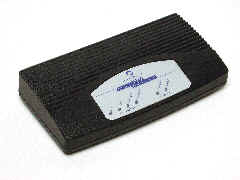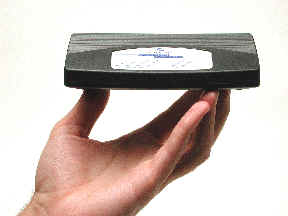|
|
Deepak Wanner, President solutions@precidia.com According to Deepak Wanner, a lot easier than you think. |
AutomatedBuildings.com
|
[an error occurred while processing this directive] |
|
|
Deepak Wanner, President solutions@precidia.com According to Deepak Wanner, a lot easier than you think. |
Introduction
Ethernet. Addressing. Twisted pair. Data
packets. The protocol stack. TCP/IP is not easy. It demands recognized experts
to design, implement and manage a TCP/IP network. Yet, TCP/IP has become the de
facto networking standard and can be found in virtually every corporate network
structure of most office environments across North America.
[an error occurred while processing this directive]As the de facto networking standard, TCP/IP is supported by all modern operating systems. It is a powerful platform for Internet connectivity and connects an office's computers, printers and servers. Its popularity has meant that the cost of implementing TCP/IP, both from a device and networking perspective, has been lowered significantly.
These benefits are taken for granted until we are faced with equipment that is not TCP/IP compatible. Serial equipment with RS232, RS422, and RS485 communication interfaces have been relegated to a standalone status. To add an additional layer of complexity, the overlaying protocol on these physical interfaces also varies from network to network. For example, one network may have standardized on LonWorks, while another has chosen BACnet, thus making internetwork communications difficult, if not impossible.
Connecting this serial equipment to a network delays the need to replace existing equipment, reduces cabling, and gives the equipment real-time access to information and enhanced functionality by leveraging the bi-directional communications capabilities of TCP/IP. Companies are not currently connecting serial equipment because of cabling limitations, high costs, and lack of technical expertise.
There are some companies who have recognized the need to gather information from, and communicate to, all electronic equipment over one common network infrastructure -TCP/IP. Precidia Technologies is one such company which has developed a suite of remote access devices which seamlessly connect serial equipment to TCP/IP networks. The low cost, easy-to-install devices allow existing serial equipment to interface to TCP/IP without any changes to a company's equipment or systems. The access devices protect current investments and support future networking technologies while offering network management features, such as SNMP support, never before possible.
Network Connectivity - Connecting the Old to
the New
Too often in the technology marketplace, a supplier's approach to legacy
equipment has been to throw it away and replace it with the "latest"
new equipment. For companies with a large base of installed serial devices and
systems, the cost of replacing this equipment and re-training front line and
support staff means only a few companies can implement a complete serial to
TCP/IP migration strategy.
 Precidia
has designed and implemented a family of products, known as remote access
devices, which handle the three major serial protocols, RS232, RS485 and RS422.
In essence, the device plugs into TCP/IP on one side and the serial equipment on
the other. The access device then takes the data from the serial equipment, such
as HVAC and metering systems, and converts that data into a TCP/IP packet to
send over the network. It integrates seamlessly into an existing TCP/IP network
and requires no changes to existing equipment, network, or systems.
Precidia
has designed and implemented a family of products, known as remote access
devices, which handle the three major serial protocols, RS232, RS485 and RS422.
In essence, the device plugs into TCP/IP on one side and the serial equipment on
the other. The access device then takes the data from the serial equipment, such
as HVAC and metering systems, and converts that data into a TCP/IP packet to
send over the network. It integrates seamlessly into an existing TCP/IP network
and requires no changes to existing equipment, network, or systems.
A TCP/IP migration strategy must be cost-effective and able to lower overall costs. Protecting the equipment and systems investment should be a top consideration in any migration strategy. The strategy should allow the serial equipment to access new features, such as system maintenance and diagnostics.
The biggest benefit of connecting HVAC and metering systems to TCP/IP is remote management. This allows companies to monitor equipment from any location and to respond quickly to emerging issues.
Limestone District School Board - Building
Automation & TCP/IP Connect
Limestone District School Board, located in Kingston, Ontario, is comprised
of 59 elementary schools. Recently, Limestone installed a Precidia access device
in each school. This allowed each of the schools, which were already on the WAN
and connected to the school board's server, to be connected to each school's
Andover Control Panel. Limestone can now remotely view and monitor each school's
HVAC system.
Dwight Allport, Mechanical Maintenance Supervisor, Limestone District School Board describes the benefits of connecting the Andover Control Panel to TCP/IP network:
"The Precidia device solved a long standing issue for Limestone: how to gather information from all of our remote locations within the school district, monitor the data and alarms from our Andover Building Control equipment and feed it into a central PC. Precidia's Ether232 provided the most cost-effective solution.
By connecting the Ether232 to the Andover device in each school's boiler/mechanical rooms, the data can now flow through our WAN to a central location. Solving this problem has been a key step in deploying our mission critical HVAC monitoring system.
The Precidia device was simple and quick to install, and its size was easy to accommodate."
Limestone has demonstrated the benefits of Precidia's solution. But the remote access devices offer solutions to many other applications. The devices allow metering equipment to be connected to a central location which facilitates remote monitoring, reduces the resources necessary for meter monitoring, and helps decrease their energy costs.
In addition, a range of security access systems can now be controlled through a centralized location over a TCP/IP network. Several door access control products including door controllers, magnetic swipe card readers, lift controllers and alarm controllers have an RS232, RS422 or RS485 serial connection can now be connected to TCP/IP.
Even electronic signs for indoor and outdoor applications can now networkable and be programmed from a centralized location
The possibilities are endless.
Products
 Precidia
Technologies offers a family of compact, easy-to-install remote access device
which seamlessly migrate RS232, RS422, and RS485 serial devices onto TCP/IP
networks.
Precidia
Technologies offers a family of compact, easy-to-install remote access device
which seamlessly migrate RS232, RS422, and RS485 serial devices onto TCP/IP
networks.
Precidia's remote access devices include:Ether232, Ether422, Ether485.
Conclusion
The importance of TCP/IP to building automation serial devices cannot be
understated. With real-time access to information, remote monitoring of
equipment and systems, and significant cost savings, the benefits to building
automation systems are immeasurable.
A solution, such as the one offered by Precidia Technologies, migrates HVAC, metering systems, and other serial equipment to TCP/IP networks. A low cost, easy-to-install, and seamless solution guarantees an easy installation, minimal management of TCP/IP access, and a quick return on investment to companies looking to connect their standalone equipment.
Precidia's technology protects legacy equipment investment, yet delivers increased features to serial devices, such network management, SNMP support, data logging, and diagnostics. In effect, serial equipment benefits from all of the features of TCP/IP. It's that easy.
[an error occurred while processing this directive]
[Click Banner To Learn More]
[Home Page] [The Automator] [About] [Subscribe ] [Contact Us]